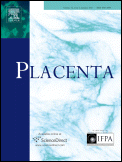Placenta (journal)
Placenta is a peer-reviewed scientific journal covering all aspects of human and animal placenta research, including the physiology, pathology, and clinical applications related to the placenta. The journal publishes original research articles, review articles, case reports, and brief communications on a wide range of topics related to the placenta, including its development, function, and abnormalities. It serves as a vital resource for obstetricians, pathologists, and research scientists interested in the study of the placenta and its role in the health of the mother and fetus.
Scope and Topics[edit | edit source]
The scope of Placenta encompasses all areas of placental research. Key topics include, but are not limited to, placental development, genetics, immunology, pathology, trophoblast invasion, placental metabolism, transport functions, and the regulation of fetal growth and development. The journal also covers clinical aspects of placental abnormalities, such as preeclampsia, placental abruption, and placenta previa, providing insights into their diagnosis, management, and outcomes.
Editorial Board[edit | edit source]
Placenta is managed by an international editorial board consisting of experts in the field of placental research. The board is responsible for maintaining the journal's high standards of scientific quality and integrity, overseeing the peer-review process, and guiding the journal's editorial policies.
Publication Details[edit | edit source]
The journal is published monthly by an established publisher in the field of medical and scientific literature. Each issue contains a mix of articles that have undergone rigorous peer review by experts in the field to ensure accuracy, relevance, and originality.
Abstracting and Indexing[edit | edit source]
Placenta is abstracted and indexed in several major scientific databases, ensuring that its content is accessible to a wide audience of researchers, clinicians, and academics. This includes indexing in PubMed, Scopus, and the Web of Science, among others.
Impact Factor[edit | edit source]
The impact factor of Placenta is a measure of the average number of citations to recent articles published in the journal. It is used as an indicator of the journal's importance within the field of placental research. The impact factor varies from year to year, reflecting the journal's influence and relevance in the scientific community.
Submission Guidelines[edit | edit source]
Authors interested in submitting to Placenta must follow the journal's submission guidelines, which detail the types of manuscripts accepted, formatting requirements, and the peer-review process. The guidelines emphasize the importance of ethical considerations, including the need for appropriate approvals for studies involving human participants or animal subjects.
Access and Subscription[edit | edit source]
Placenta offers a range of access options, including subscription-based access and open access for individual articles. This ensures that researchers and practitioners can access the content in a manner that suits their needs and preferences.
Navigation: Wellness - Encyclopedia - Health topics - Disease Index - Drugs - World Directory - Gray's Anatomy - Keto diet - Recipes
Search WikiMD
Ad.Tired of being Overweight? Try W8MD's physician weight loss program.
Semaglutide (Ozempic / Wegovy and Tirzepatide (Mounjaro / Zepbound) available.
Advertise on WikiMD
WikiMD is not a substitute for professional medical advice. See full disclaimer.
Credits:Most images are courtesy of Wikimedia commons, and templates Wikipedia, licensed under CC BY SA or similar.Contributors: Prab R. Tumpati, MD

